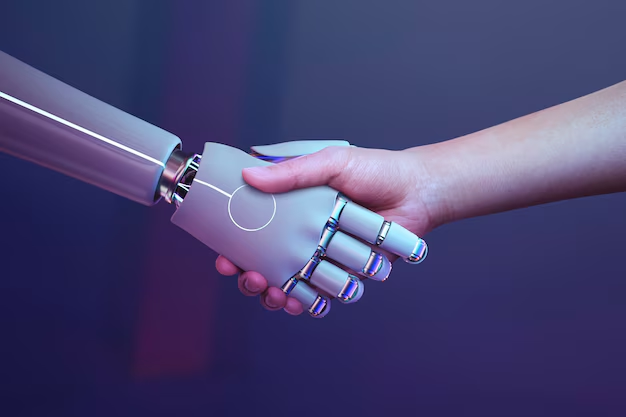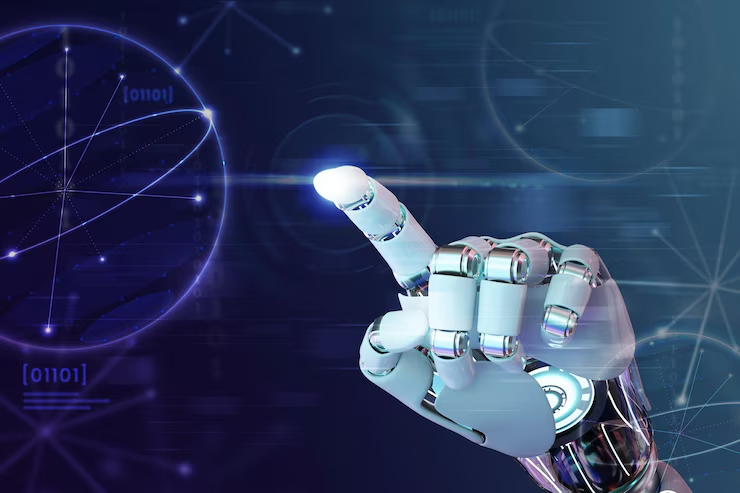AI is predicted to contribute over $15 trillion to the global economy by 2030″ (Source: McKinsey Global Institute).
“Is AI replacing marketers, or is it empowering them?”
Remember when AI-powered chatbots were clunky and frustrating? Now, they’re having human-like conversations and providing valuable customer support.
Introduction
Artificial Intelligence (AI) has fundamentally changed the landscape of digital marketing. In addition to streamlining routine tasks, AI now powers advanced strategies, providing highly personalized experiences and revealing extraordinary insights. This comprehensive analysis will investigate the diverse applications of AI in digital marketing, focusing on its transformative effects and the ethical issues that need to be considered.
1. AI-Driven Content Creation: From Concept to Distribution
Beyond Basic Generation:
AI tools have evolved beyond simple text generation. They now:
- Create innovative content formats: Develop captivating scripts for short videos (TikTok, Reels), write engaging captions for social media, and even compose persuasive ad copy.
- Customize content in bulk: Adjust content to align with individual user preferences, browsing habits, and purchasing behaviors, cultivating stronger connections and increased engagement.
- Enhance content for search engines: Examine search intent, analyze competitor keywords, and identify content gaps to produce SEO-friendly articles, blog posts, and website copy that achieve better rankings in search results.
- Adapt existing content: Convert lengthy articles into brief social media updates, generate enticing video snippets, and create compelling email subject lines.
Example:
- Jasper.ai: An advanced AI writing tool that can create different types of content, translate languages, and summarize text as well.
- Grammarly: Offers more than just traditional grammar and spell-checking, providing AI-driven recommendations to enhance clarity, conciseness, and overall writing style.
2. AI-Powered SEO: Enhancing Search Visibility
Keyword Research on Steroids:
Tools driven by AI go beyond basic keyword volume assessments. They:
- Examine search intent: Grasp the fundamental motivations behind user queries, which aids in selecting more focused keywords.
- Anticipate upcoming search trends: Discover new keywords and topics that are gaining popularity, allowing for forward-thinking content strategies.
- Perform competitive evaluations: Investigate competitor sites to pinpoint keyword gaps and opportunities for gaining an advantage.
On-Page Optimization Elevated:
- AI-driven site crawlers: Assess website architecture, pinpoint broken links, and recommend technical SEO enhancements for improved search engine crawling.
- Content enhancement suggestions: Evaluate content clarity, keyword usage, and user interaction to provide recommendations for improved search engine performance.
Example:
- SEMrush: An all-in-one SEO tool with AI-driven features for keyword exploration, competitive assessments, on-page optimization and more.
SEO in the Age of AI: Adapting Your Strategy for Search Generative Experience (SGE)
3. AI-Driven Social Media Marketing: Captivating Audiences on Every Platform
Highly Tailored Social Media Campaigns:
- AI-based targeting: Move past simple demographic data to focus on users’ interests, behaviors, and even their emotional responses.
- Real-time creative optimization: Experiment with various ad versions live, modifying aspects such as visuals, text, and calls to action for the best outcomes.
- Predictive insights: Anticipate how campaigns will perform, spot potential challenges, and proactively tweak strategies for the greatest effectiveness.
Enhancing Social Media Management:
- Automated scheduling and posting: Plan posts across various platforms to maintain a consistent brand image and post at the most effective times.
- Social monitoring and sentiment tracking: Keep an eye on social media discussions, track brand mentions, and gauge customer sentiment instantly.
- Chatbot integration: Utilize AI-powered chatbots to interact with followers, respond to common inquiries, and deliver immediate customer support.
Example:
- Hootsuite: A social media management platform with AI-powered features for scheduling, analytics, and social listening.
4. AI Chatbots: Revolutionizing Customer Service
24/7 Availability and Instant Support:
- AI-driven chatbots: Deliver immediate customer support, address commonly asked questions, and resolve frequent problems around the clock, enhancing customer satisfaction and lowering support expenses.

- Customized interactions: Evaluate customer information to offer personalized recommendations, deliver tailored assistance, and strengthen customer relationships.
Proactive Customer Outreach:
- Action-based engagements: Start proactive dialogues with customers based on their actions, including browsing patterns, purchase history, and site activities.
- Tailored product suggestions: Present suitable product recommendations rooted in customer interests, browsing patterns, and purchasing history.
Example:
- Drift: A conversational AI platform that allows businesses to interact with website visitors in real time and provide customized assistance.
5. Predictive Analytics in Marketing: Anticipating the Future
Customer Segmentation on Steroids:
- AI-driven customer segmentation: Move beyond simple demographics to categorize customers according to their interests, behaviors, preferences, and emotional responses.
- Predictive modeling: Anticipate customer actions, such as the likelihood of a purchase, the risk of churn, and overall lifetime value, enabling proactive marketing strategies.
Informed Decision Making:
- AI-driven dashboards: Offer immediate insights into the effectiveness of campaigns, customer behaviors, and market dynamics, facilitating data-driven decision making.
- Scenario analysis: Model various marketing scenarios and forecast possible outcomes, allowing marketers to refine campaigns for optimal ROI.
Example:
- Adobe Analytics: A robust analytics platform featuring AI-driven capabilities for customer segmentation, predictive modeling, and informed decision making.
Must Read: The Impact of Algorithm Changes on Social Media Marketing
6. Ethical Considerations in AI Marketing: Addressing the Challenges
Data Privacy and Security:
- Data protection: Ensure adherence to data privacy laws (e.g., GDPR, CCPA) by putting in place strong data security practices and securing explicit consent from users.
- Transparent data usage: Inform customers about the methods of data collection, utilization, and protection processes in a clear manner.

Bias and Fairness:
- Algorithmic bias: AI systems may carry forward and even exacerbate existing societal biases (such as those related to gender, race, or socioeconomic status) present in their training data. This can result in unjust or discriminatory effects in marketing initiatives, like offering less favorable deals to some demographics or omitting certain groups from relevant advertising.
- Mitigating bias:
- -Data diversity: Ensure that the data utilized for training AI models is varied and reflective of the intended audience.
- -Regular audits: Conduct routine evaluations of AI systems for bias and take corrective actions as necessary.
- -Human oversight: Keep human intervention present in the creation and execution of AI systems to guarantee ethical and responsible applications.
Transparency and Explainability:
- Explainable AI (XAI): Craft AI models that are transparent and easy to understand, helping marketers comprehend how decisions or suggestions are reached by the AI system.
- Communicate AI usage: Make it clear to customers how AI is integrated into marketing efforts to foster trust and openness.
Job Displacement:
- Reskilling and upskilling: Allocate resources towards development programs that aid marketing professionals in adjusting to the evolving landscape and utilizing AI to improve their skill set.
- Focus on human-centric roles: Highlight the significance of human creativity, strategic thought, and emotional intelligence in marketing, which are challenging for AI to replicate.
Conclusion
AI in Digital Marketing is revolutionizing, offering unprecedented opportunities for marketers to improve their efficiency, effectiveness, and overall performance. By embracing AI technologies while addressing the associated ethical considerations, marketers can unlock new levels of creativity, innovation, and success in the digital age.


